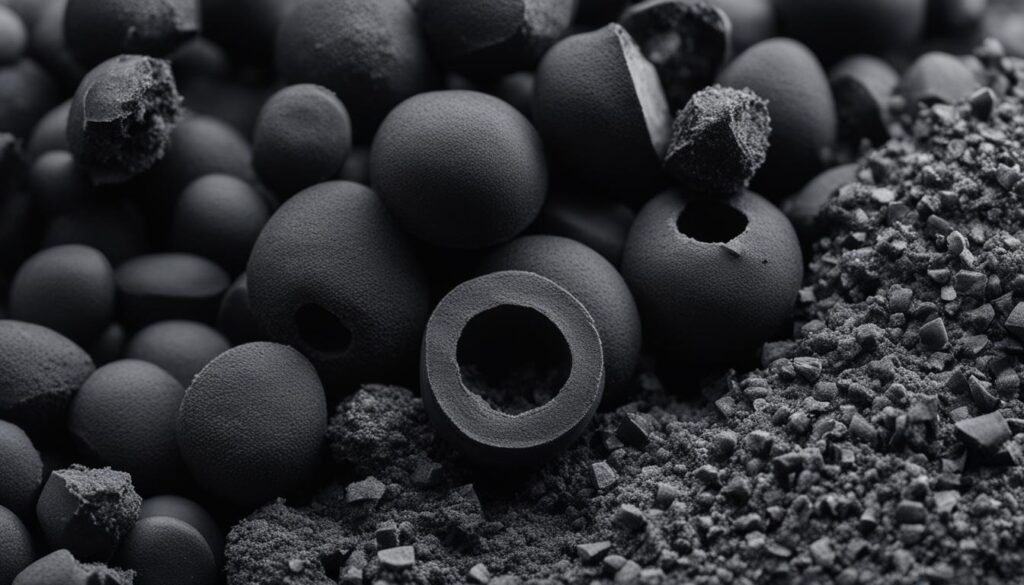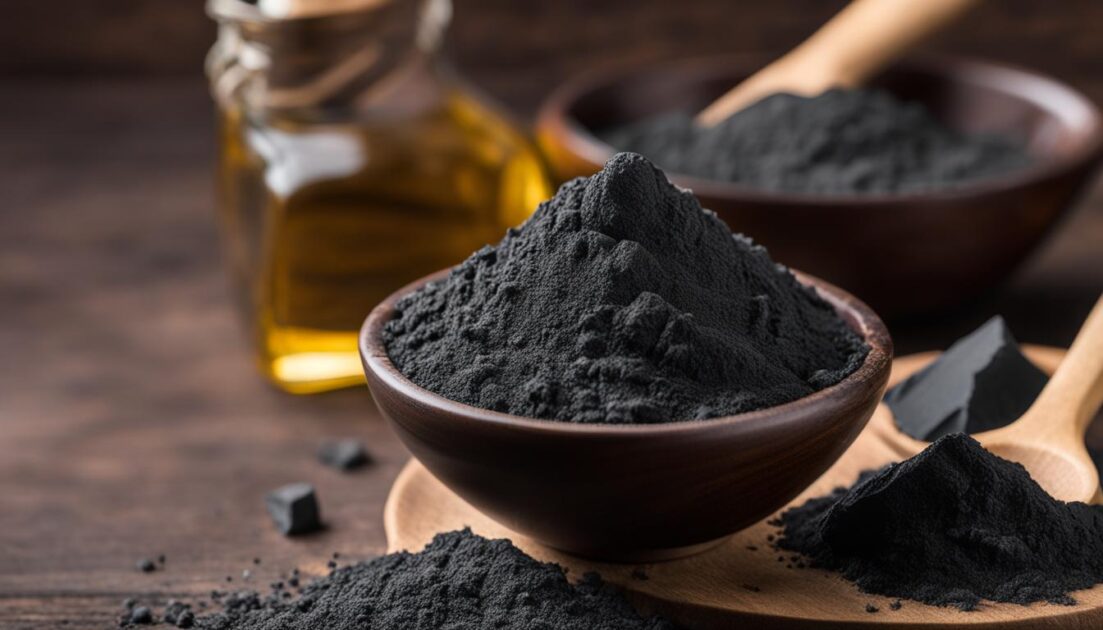Activated charcoal is a fine, black powder that has various uses and benefits. It is commonly used in emergency rooms to treat overdoses, but it also has other potential benefits. Some of the uses of activated charcoal supported by evidence include improving kidney health, reducing intestinal gas, water filtration, treating diarrhea, teeth whitening and oral health, skin care, and as a deodorant. Additionally, it can be used to treat skin infections and as an emergency treatment for poisonings. However, it is important to note that there is not enough conclusive research to establish the benefits of activated charcoal in all cases. It is best to consult a healthcare professional before using activated charcoal as a treatment.
Key Takeaways:
- Activated charcoal has various uses, including detoxification, teeth whitening, and improving skin health.
- It is commonly used in emergency rooms for the treatment of poisonings and drug overdoses.
- Some of the benefits of activated charcoal are supported by evidence, but more research is needed to fully understand its efficacy.
- Consulting a healthcare professional is recommended before using activated charcoal as a treatment.
- Activated charcoal should be stored in a cool, dry place and used within its expiration date.
History and Origin of Activated Charcoal
Activated charcoal has a rich history dating back to ancient times, where it was widely recognized for its medicinal properties. The process of creating activated charcoal involves subjecting carbon-rich materials, such as wood, peat, coconut shells, or sawdust, to extremely high temperatures. This intense heating process results in the formation of a fine black powder with exceptional absorbent qualities and a large surface area.
Throughout history, activated charcoal has been used in a variety of applications. However, its most prominent use has been in emergency rooms, where it has been approved by the World Health Organization as an effective treatment for poisoning cases. The ability of activated charcoal to adsorb toxins and poisons makes it an invaluable tool in modern medicine.
While the history of activated charcoal is well-established, ongoing research is continually exploring its potential benefits and applications. The versatile nature of activated charcoal has led to its use in various fields, including skincare, oral health, culinary concoctions, and even household deodorizers.
Activated charcoal has a remarkable ability to adsorb toxins and impurities, making it an incredibly valuable substance in medicine and beyond.
Despite its long history, the benefits of activated charcoal in different conditions are still being explored. It is important to approach the use of activated charcoal with caution and consult healthcare professionals for guidance on its appropriate application.
Next, we will delve into the properties and key components of activated charcoal, shedding light on what makes this substance so unique and effective.
Properties and Key Components of Activated Charcoal

Activated charcoal is a highly absorbent substance known for its remarkable properties and composition. It is made up of carbon-rich materials that undergo a superheating process, resulting in the creation of small pores and an increased surface area. This unique porous structure enables activated charcoal to effectively bind to molecules, ions, and atoms, effectively removing them from dissolved substances.
The key components of activated charcoal are carbon and oxygen, which are combined through the activation process. The activation procedure also plays a crucial role in reducing the size of the pores in the charcoal, further enhancing its ability to adsorb toxins and other substances.
Properties of Activated Charcoal:
- Highly absorbent
- Porous texture
- Large surface area
- Efficient binding capabilities
Key Components:
- Carbon
- Oxygen
The combination of these components and the porous structure of activated charcoal make it an exceptional adsorbent, capable of attracting and trapping various harmful substances.
Furthermore, activated charcoal’s composition allows it to effectively adsorb a wide range of toxins, chemicals, and impurities, making it a valuable tool in various applications.
| Properties | Description |
|---|---|
| Highly absorbent | Activated charcoal possesses a remarkable ability to absorb and bind to substances, promoting detoxification and purification processes. |
| Porous texture | The presence of numerous pores creates an expansive surface area, enabling activated charcoal to effectively capture and trap toxins. |
| Large surface area | Activated charcoal’s surface area is significantly enlarged due to the porous structure, enhancing its adsorption capabilities. |
| Efficient binding capabilities | The intricate porous composition enables activated charcoal to efficiently bind to a wide range of molecules, ions, and atoms, facilitating their removal from dissolved substances. |
With its unique properties and key components, activated charcoal has found applications in numerous fields, ranging from medicine to skincare and beyond. The next sections will explore the culinary, personal, and household uses of this remarkable substance.
Natural Culinary and Personal Product Uses of Activated Charcoal

Activated charcoal has become increasingly popular for its diverse applications in both culinary and personal care products. Let’s explore some of the fascinating uses of activated charcoal in these areas.
Culinary Uses
In the culinary world, activated charcoal has gained attention for its potential detoxifying properties and striking appearance when added to various recipes. It has become a prominent ingredient in several innovative dishes:
- Charcoal Lemonade: This refreshing drink combines the tangy citrus flavors of lemon with the deep black color of activated charcoal, creating a unique and eye-catching beverage.
- Black Ice Cream: Activated charcoal adds a captivating dark hue to ice cream, making it an enticing treat. It’s perfect for those looking for an unexpected twist in their dessert.
- Activated Charcoal Bread: This charcoal-infused bread not only stands out with its vibrant contrast against traditional bread but also offers an intriguing flavor profile that complements a range of accompaniments.
Personal Product Uses
Activated charcoal has also found its way into personal care products, with many skincare enthusiasts and oral health advocates incorporating it into their routines. Here are a few examples:
“Activated charcoal effectively draws out impurities from the skin, making it a popular ingredient in skincare products. It provides a deep cleanse and leaves your skin feeling refreshed and rejuvenated.”
| Product Type | Common Uses |
|---|---|
| Face Masks | Helps to unclog pores, remove excess oil, and detoxify the skin |
| Cleansers | Assists in removing dirt, makeup, and other impurities from the skin |
| Scrubs | Helps to exfoliate and polish the skin, leaving it smooth and revitalized |
| Toothpaste and Mouthwash | Believed to whiten teeth and support oral health by removing surface stains and bacteria |
When used in skincare and oral care products, activated charcoal offers a range of potential benefits, including deep cleansing, detoxification, and oral hygiene improvements.
By embracing activated charcoal in both culinary and personal product applications, people can enjoy its unique properties and potentially experience a multitude of benefits. However, it’s important to remember that individual results may vary, and consulting a healthcare professional or dermatologist is always recommended before incorporating new ingredients into your routine.
Household and Other Topical Uses of Activated Charcoal

Activated charcoal offers a range of practical applications in households and topical treatments. Its versatile properties make it a popular choice for various uses. Let’s explore some of the common household and topical uses of activated charcoal.
Household Uses:
Activated charcoal acts as a natural deodorizer, effectively eliminating unpleasant odors in various settings. Here are a few common household applications:
- Refrigerators: Place a small bowl filled with activated charcoal in your refrigerator to absorb any lingering food odors.
- Shoes: Keep your shoes smelling fresh by placing activated charcoal sachets or insoles inside them.
- Underarms: For natural odor control, try using activated charcoal deodorant to keep underarm odors at bay.
Topical Uses:
Activated charcoal is renowned for its potential detoxifying properties when used topically. It is commonly incorporated into skincare products and offers several benefits:
- Face Masks: Activated charcoal face masks can help draw out impurities and toxins from the skin, leaving it refreshed and rejuvenated.
- Cleansers: Incorporating activated charcoal cleansers into your skincare routine can assist in deep cleansing by removing dirt, oil, and other impurities.
- Scrubs: Activated charcoal scrubs help exfoliate the skin, sloughing off dead cells and promoting a smoother complexion.
It’s important to note that while activated charcoal has gained popularity for its various uses, further research is necessary to fully comprehend its effectiveness in different applications. Always consult with a healthcare professional or specialist before using activated charcoal for any household or topical use.
Benefits and Applications of Activated Charcoal

Activated charcoal is a versatile substance with numerous benefits and applications. Extensive research has supported its potential for various beneficial effects, making it a popular choice in different fields. Some of the key benefits and applications of activated charcoal are:
Promotes Kidney Function
Studies have shown that activated charcoal can help improve kidney function by removing toxins and waste products from the body. It functions as a natural detoxifier, aiding in the elimination of harmful substances and reducing the workload on the kidneys.
Reduces Intestinal Gas
Activated charcoal is known for its ability to absorb and eliminate gas, providing relief from bloating and discomfort caused by excess gas in the digestive system. It works by adsorbing the gas molecules and toxins, reducing their presence in the gut.
Lowers Cholesterol Levels
Research suggests that activated charcoal may have the potential to lower cholesterol levels by adsorbing cholesterol and bile acids in the digestive system. This can contribute to improved cardiovascular health and reduced risk of heart disease.
Emergency Treatment for Poisonings and Drug Overdoses
Activated charcoal is widely used in emergency rooms as a treatment for poisonings and drug overdoses. Its adsorptive properties enable it to bind to toxic substances, preventing their absorption into the bloodstream and reducing their harmful effects on the body.
Water Filtration
With its excellent adsorption capabilities, activated charcoal is commonly employed in water filtration systems. It effectively removes impurities, chemicals, and toxins, ensuring cleaner and safer drinking water.
Skincare and Deep Cleansing
Activated charcoal is a popular ingredient in skincare products due to its ability to draw out impurities and toxins from the skin. It is used in face masks, cleansers, and scrubs to provide a deep cleanse, unclog pores, and promote overall skin health.
While these benefits show promise, it is important to note that more research is necessary to fully understand the efficacy of activated charcoal in different applications. As with any treatment, it is recommended to consult with a healthcare professional before using activated charcoal for any specific purpose.
Usage Tips and Cautions for Activated Charcoal

When utilizing activated charcoal, it is essential to adhere to certain guidelines and precautions to ensure its safe and effective use. Taking these precautions can help optimize the benefits of activated charcoal while minimizing potential risks. Here are some valuable usage tips and cautions to keep in mind:
Consult a Healthcare Professional
Before incorporating activated charcoal into your health regimen or using it as a treatment, it is highly recommended to consult a healthcare professional. They can provide personalized guidance and advice based on your specific health needs and possible interactions with medications or underlying conditions.
Activated Charcoal as a Supplement, Not a Substitute
Activated charcoal should never be used as a substitute for medical advice or treatment. While it can offer potential benefits, it is crucial to seek professional medical care for any health concerns or conditions rather than relying solely on activated charcoal.
Timing is Key
For activated charcoal to be effective, it should ideally be taken within 1 to 4 hours after consuming a toxin or drug. This timeframe allows the charcoal to bind to the harmful substances and prevent their absorption into the body. Taking it promptly can enhance its efficacy.
Limitations on Toxin Binding
Activated charcoal cannot bind to all types of toxins or drugs, particularly those that are corrosive. It is essential to be aware of the limitations. In emergency situations or when unsure of the nature of the toxin, always seek immediate medical attention.
Side Effects and Interactions
Like any substance, activated charcoal may have potential side effects and interactions with medications. It is essential to be mindful of your body’s response and any adverse effects. Common side effects may include constipation, nausea, and vomiting. Additionally, activated charcoal can interfere with the absorption of certain medications, so it is crucial to consult with a healthcare professional if you are taking any prescription drugs.
Follow Recommended Dosage and Instructions
Always follow the recommended dosage and usage instructions provided by the manufacturer or healthcare professional. This ensures that you are using activated charcoal safely and effectively. Ignoring dosage guidelines can lead to ineffective or excessive use, increasing the risk of adverse effects.
Incorporating these usage tips and cautions into your activated charcoal routine can help you maximize its potential benefits while minimizing any associated risks or complications.
Selecting the Best Quality Activated Charcoal
When it comes to choosing activated charcoal, it is crucial to opt for a product of the highest quality. Here are some key factors to consider:
- Natural Sources: Look for activated charcoal that is derived from natural sources such as wood, coconut shells, or peat. These materials undergo a stringent activation process to ensure optimal effectiveness.
- Thorough Activation: Ensure that the activated charcoal has undergone a thorough activation process, which involves superheating the carbon-rich materials to create a highly porous structure. This porous texture enhances its adsorptive properties, allowing it to effectively bind to toxins and impurities.
- Vetted or Recommended Products: Consider choosing activated charcoal products that have been vetted or recommended by reputable sources or healthcare professionals. This can provide you with the assurance of selecting a reliable and trustworthy product.
- Customer Reviews: Read customer reviews to gain insights into the experiences of others who have used the product. This can help you make an informed decision based on real-life experiences and feedback.
- Certifications and Quality Standards: Check if the activated charcoal product has any certifications or meets specific quality standards. These certifications can indicate that the product has undergone rigorous testing and adheres to specific quality criteria.
Remember, the quality of activated charcoal is essential to ensure its efficacy and safety. By considering these factors and choosing a high-quality product, you can experience the full benefits of activated charcoal.
Storing Activated Charcoal
Proper storage of activated charcoal is crucial to ensure its effectiveness for future use. Follow these tips to store activated charcoal:
- Store in a cool, dry place: Keep the activated charcoal in a location where it is protected from moisture and direct sunlight. Excessive heat and humidity can affect its absorption properties.
- Tightly seal the packaging: Seal the packaging of the activated charcoal tightly to prevent air or moisture from entering. This will help maintain its efficacy.
- Separate from other substances: Store activated charcoal separately from other chemicals or substances to avoid any cross-contamination. This will ensure its purity and prevent any unwanted reactions.
- Check the expiration date: Regularly check the expiration date of the activated charcoal and discard any expired or ineffective products. Expired charcoal may not be as potent and may not deliver the desired results.
By following these storage tips, you can extend the shelf life of your activated charcoal and ensure its efficacy when you need it.
| Storage Tips for Activated Charcoal |
|---|
| Store in a cool, dry place |
| Tightly seal the packaging |
| Separate from other substances |
| Check the expiration date |
Risks and Precautions of Using Activated Charcoal
While activated charcoal is generally considered safe, there are some risks and precautions to be aware of. It is important to understand the potential side effects and interactions before using activated charcoal as a treatment. Here are some important considerations:
- Side Effects: Some individuals may experience side effects when using activated charcoal. Common side effects include constipation, nausea, and vomiting. These effects are usually mild and temporary.
- Hydration: It is important to drink plenty of water when taking activated charcoal to prevent dehydration. Adequate hydration promotes proper bowel movements and helps prevent constipation.
- Interactions with Medications: Activated charcoal can interact with certain medications, reducing their absorption and effectiveness. It is recommended to consult a healthcare professional before using activated charcoal, especially if you are taking any medications, including over-the-counter drugs and supplements.
- Underlying Health Conditions: If you have any underlying health conditions, it is important to consult your healthcare provider before using activated charcoal. They can provide personalized advice based on your specific health needs.
- Pregnancy and Breastfeeding: Pregnant or breastfeeding individuals should consult their healthcare provider before using activated charcoal. The safety of activated charcoal during pregnancy and breastfeeding has not been fully established.
By being aware of these risks and taking the necessary precautions, you can safely incorporate activated charcoal into your wellness routine.
Conclusion
Activated charcoal is a versatile substance that offers numerous uses and potential benefits. With a long history of medicinal use, it is widely recognized for its effectiveness in emergency rooms, especially for treating overdoses and poisonings. Beyond these critical situations, activated charcoal has demonstrated its value in improving kidney function, reducing uncomfortable intestinal gas, and providing water filtration. Additionally, it has proven beneficial in treating diarrhea, promoting oral health, enhancing skincare regimens, and serving as a reliable household deodorizer.
While activated charcoal holds promise for various applications, it is essential to note that additional research is required to fully comprehend its potential benefits and efficacy in different contexts. As such, seeking guidance from a healthcare professional is highly recommended before integrating activated charcoal into your treatment plan.
With its extensive history and promising uses, activated charcoal remains a powerful tool in various industries. With proper caution and guidance, individuals can harness its potential benefits and tap into its wide range of applications. As science continues to explore and expand our understanding of activated charcoal, the potential for even more diverse uses and benefits emerges.
FAQ
What are the uses and benefits of activated charcoal?
Activated charcoal has various uses and potential benefits, including improving kidney health, reducing intestinal gas, water filtration, treating diarrhea, teeth whitening and oral health, skincare, and as a deodorant. It is also used as an emergency treatment for poisonings and overdoses. However, it is important to consult a healthcare professional before using activated charcoal as a treatment.
Where does activated charcoal come from?
Activated charcoal is made through a process of superheating carbon-rich materials, such as wood, peat, coconut shells, or sawdust, to very high temperatures. This process creates a fine black powder that is highly absorbent and has a large surface area.
What are the properties and key components of activated charcoal?
Activated charcoal has a porous texture and is made up of carbon and oxygen. The activation process reduces the size of the pores in the charcoal, making it more effective at adsorbing toxins and other substances.
How is activated charcoal used in culinary and personal products?
Activated charcoal is added to food and beverages for its purported detoxifying properties. It is also found in skincare products such as face masks, cleansers, and scrubs, as well as toothpaste and mouthwash for teeth whitening and oral health.
What are the household and topical uses of activated charcoal?
Activated charcoal is commonly used as a natural deodorizer and can be found in water filters. It is also used topically in skincare products, as well as for treating skin infections and as an emergency treatment for poisonings.
What are the benefits and applications of activated charcoal?
Some potential benefits supported by research include improving kidney function, reducing intestinal gas, and lowering cholesterol levels. Activated charcoal is also used in water filtration systems and in skincare to draw out impurities and toxins.
What are the usage tips and cautions for activated charcoal?
It is recommended to consult a healthcare professional before using activated charcoal, take it within 1 to 4 hours of consuming a toxin or drug, and be aware of potential side effects and interactions with medications. It should not be used as a substitute for medical advice or treatment.
How do I select the best quality activated charcoal?
Look for activated charcoal products made from natural sources that have undergone a thorough activation process. Choose products recommended by reputable sources or healthcare professionals, and consider reading customer reviews and checking for certifications or quality standards.
How should activated charcoal be stored?
Activated charcoal should be stored in a cool, dry place, away from moisture and direct sunlight. The packaging should be tightly sealed to prevent air or moisture from entering. It should be stored separately from other substances or chemicals to avoid cross-contamination.
What are the risks and precautions of using activated charcoal?
Side effects may include constipation, nausea, and vomiting. It can also interact with certain medications, reducing their absorption and effectiveness. Pregnant or breastfeeding individuals should consult their healthcare provider before using activated charcoal.






